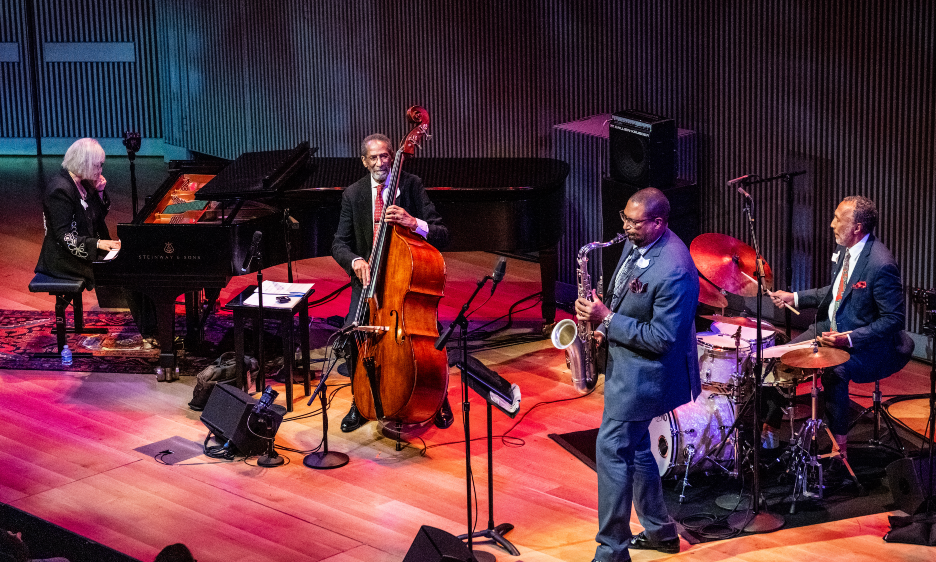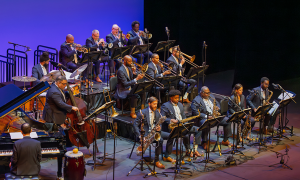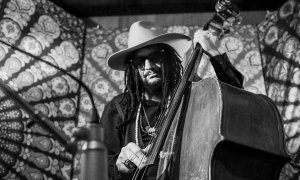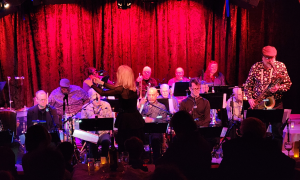Home » Jazz Articles » Live Review » Ron Carter's Foursight Quartet at Miner Auditorium
Ron Carter's Foursight Quartet at Miner Auditorium

Courtesy Steven Roby
We try to play our brains out every night… You are very fortunate to see this band when they are firing on all five cylinders.
—Ron Carter
Miner Auditorium / SFJAZZ Center
San Francisco, CA
September 19, 2025
After a 50-minute opener with no introductions, Ron Carter took the microphone, smiled, and deadpanned, "Thank you and goodnight." A beat later: "I am boss of the microphone." He waved his cuffs toward the band to take a real bow. The joke set the tone. Leadership would not be loud. Time, taste, and the craft of saying exactly what needs to be said—and no more—would run the night.
The quartet—Renee Rosnes on piano, Jimmy Greene on tenor saxophone, and Payton Crossley on drums—was making a rare San Francisco appearance. Carter, now 88, carries a résumé that runs from Miles Davis' second great quintet to more than 2,300 recording credits and a Guinness World Records citation as the most-recorded jazz bassist. But the point was not numbers; it was how he uses that history to shape a room's expectations and turn four musicians into one mind.
The evening's theme emerged early: editing as an art form. Carter dedicated "Cut and Paste" to those who once worked with paper and glue, but the idea applied to everything the band played. Each tune felt like a layout meeting. Melodies were placed, trimmed and rearranged so the story would read cleanly. Solos did not ramble; they clarified.
Foursight opened with "Mr. Bow Tie," a suite of shifting grooves and keys, stitched together without announcements. On stage, the jackets were dark and lapel flowers white; the music wore the same uniform—elegant, unified, purposeful. Rosnes set the path, Greene entered with a held note that rippled into a samba-tinged release, and the audience answered with hoots. When Greene finished, Carter gave a two-handed flourish—both a conductor's cue and a mentor's approval. Crossley's transitions —sticks to brushes to fingertips—were small master classes in motion control; the cymbals at the end sounded like a door quietly shut, not slammed.
Only then did Carter properly greet the house. "What a great time it is to have this music and to have people here watching us enjoy earning a living." The line drew laughs, but his next one landed deeper: "These are strange times right now, and music can help the soul if you find the right people to help bring the soul to light." He looked toward Greene, Rosnes, and Crossley: "Tonight...are the right people." The evening kept proving him right.
He introduced the next piece with, "Most of our songs have a story, except this one," and then made a walking line that suggested a story anyway. Greene and Rosnes shadowed his figures in parallel before the tenor circled up the scale, and the piano answered with a run from the same sentence. The fade to solo bass closed like a parenthesis; Carter's "Thank you, times three" was the period.
"My Funny Valentine" arrived as the night's most revealing chapter. Rosnes brushed the melody into the room; the audience chuckled in recognition. Carter's answer—left hand high, right hand low—said that a standard is not a museum piece but a set of choices. He let notes hang like questions, then replied with harmonics or short tremors of rhythm. Rosnes moved from hush to ripples to a careful landing of the theme. Crossley's cymbal was barely there; that was the point. Rosnes stood to bow at the end, and no one could blame her.
"Cut and Paste" came with bebop bite and newsroom speed. Greene punctuated phrases like headlines; Rosnes became a lightning typesetter—right hand setting italics, left hand locking columns. Crossley dotted the lines with rimshots that read like copy-desk marks. And then—full stop. The cleanest ending of the night, because typesetters and bassists alike know when the layout is done.
The soul of Carter's leadership revealed itself fully on "You Are My Sunshine." He began with four declarative notes—thesis, revision and reframing. Only after reshaping the material did he let the famous tune shine through. Midway, he folded in a classical turn, then walked it into a boogie-woogie stroll, making American memory sound continuous rather than divided. Overtone chimes, right-hand strums, and sliding left-hand accents—none of it felt showy. It felt like a craftsman taking apart a toy to show a child the gears. San Franciscans are not quick to leap to their feet; here, they did. Carter put a hand over his heart, then teased the crowd—"And then I wrote..."—letting the laugh clear the air before the close.
Throughout, the leader kept reminding everyone what the evening meant to him. "We try to play our brains out every night...you are very fortunate to see this band when they are firing on all five cylinders," he said with a mischievous grin, adding that there was "some special shit going on here right now." In most hands, that line would sound like a boast. In his, it sounded like a witness statement—competence verifying joy.
The rapport within Foursight deserves its own paragraph. Rosnes, long admired here from her SFJAZZ Collective tenure, offered poise, clarity and a readiness to pivot. Greene—whom Carter praises for "an old-timer's concept of form"—played with a centered tone that never turned hard to make its point; the grain of his sound carried the emotion. Crossley put as much care into a whispering brush pattern as some drummers give to an overhand crash, and the music benefited from that proportion. And Carter—the bassist who changed what the instrument could be and how often it could be recorded—did what he had always done best: listened harder than anyone else and made everyone else sound more like themselves.
"You and the Night and the Music" closed the set with a nod to the leader's own discography; he has returned to the tune across decades, from The Bass and I (Blue Note Records, 1997) to Foursight—The Complete Stockholm Tapes (In & Out Records, 2022). Greene took the first ride, Crossley answered in light strokes, and the full group moved as a single body around the theme. When the house stood again, Carter draped a colorful scarf over his shoulders and bowed, palms together—a sly coda to a night about elegance without stiffness.
At the lobby merch booth, 100% silk crepe de chine pocket squares embroidered with Ron Carter's name read like a footnote, not a hard sell. The real product was the lesson the concert had delivered: swing is a matter of proportion; beauty is a matter of decisions; leadership is a matter of listening. Before the finale, Carter promised, "We leave you feeling better at least!" That is the offer he has carried since Detroit, through the Miles Davis road years, through the studio calendars—music that orders chaos without denying it. As he shuffled off, tugging playfully at that scarf, the thought lingered that he was still editing the air, one measured phrase at a time. If the future of this tradition belongs to musicians who treat every tune as a story worth telling and revising, Ron Carter is still writing the manual. The next bassist who wants to learn how to lead without shouting will keep studying nights like this one.
Setlist
"Mr. Bow Tie," "Flamenco Sketches," "My Funny Valentine," "Cut and Paste," "You Are My Sunshine," "You and the Night and the Music."Tags
Live Review
Ron Carter
Steven Roby
United States
California
san francisco
Renee Rosnes
Jimmy Greene
Payton Crossley
Miles Davis
SFJAZZ Collective
PREVIOUS / NEXT
Ron Carter Concerts
Support All About Jazz
 All About Jazz has been a pillar of jazz since 1995, championing it as an art form and, more importantly, supporting the musicians who make it. Our enduring commitment has made "AAJ" one of the most culturally important websites of its kind, read by hundreds of thousands of fans, musicians and industry figures every month.
All About Jazz has been a pillar of jazz since 1995, championing it as an art form and, more importantly, supporting the musicians who make it. Our enduring commitment has made "AAJ" one of the most culturally important websites of its kind, read by hundreds of thousands of fans, musicians and industry figures every month.
























